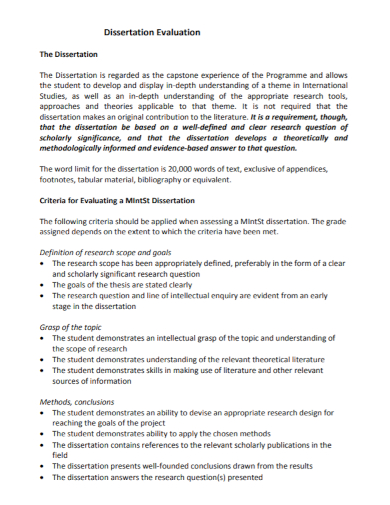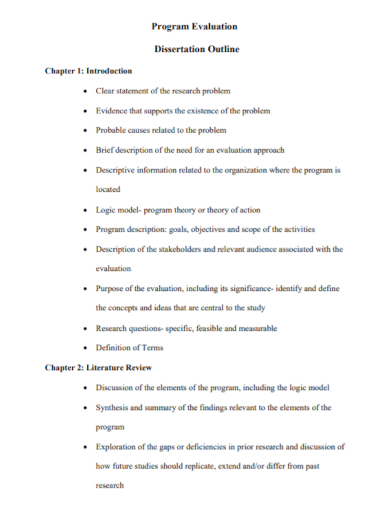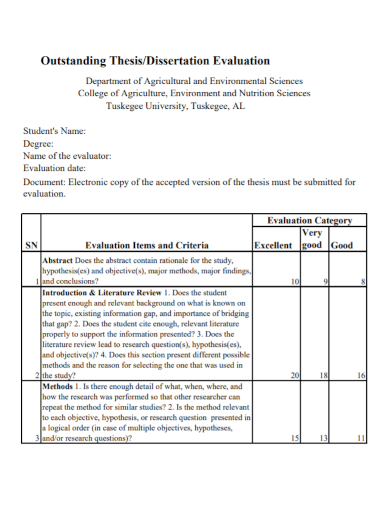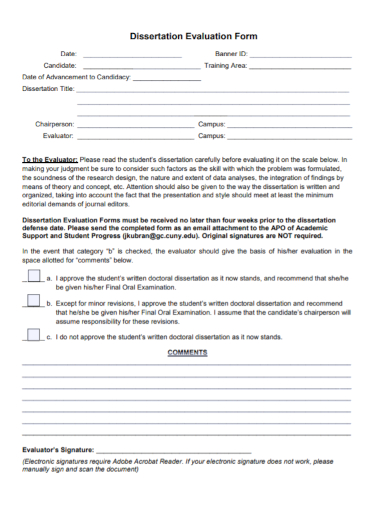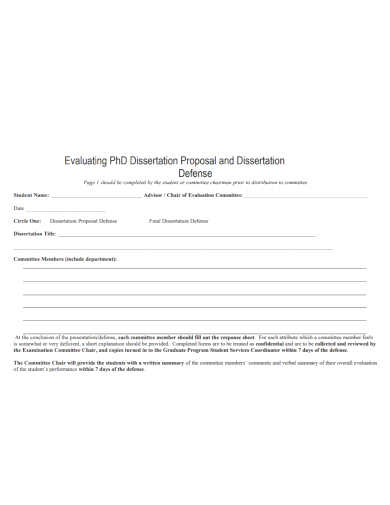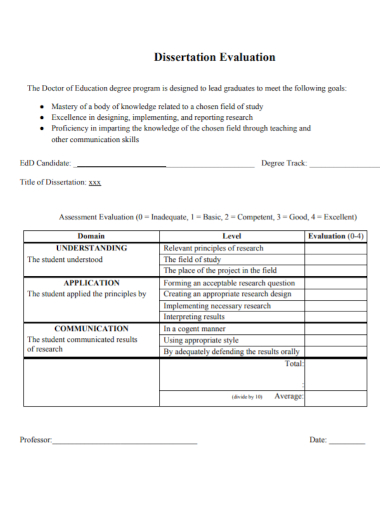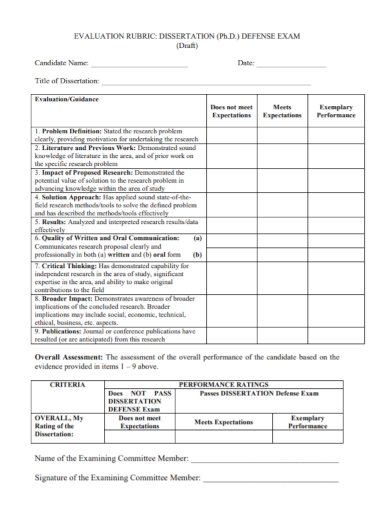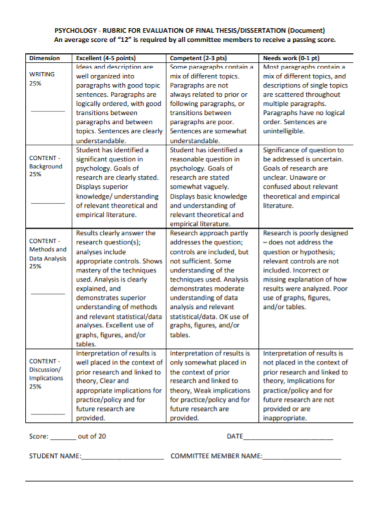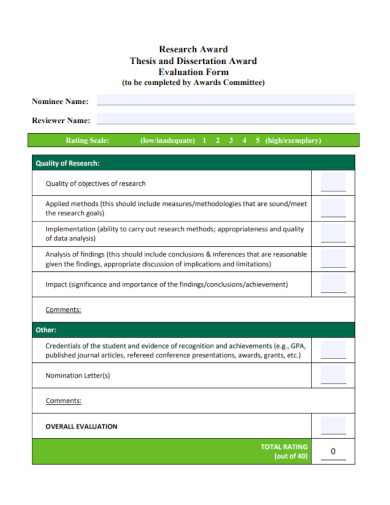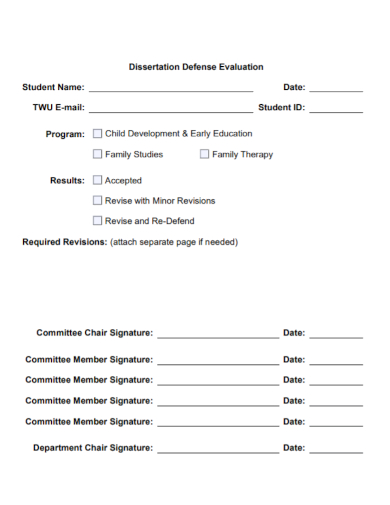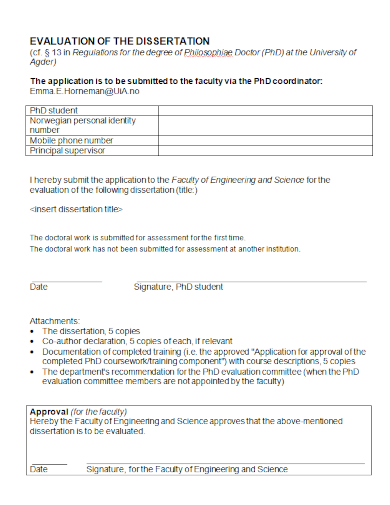Writing a dissertation paper is a compulsory requirement if you are pursuing a master’s or Ph.D. degree. Writing a dissertation can be a daunting task to do and it can intimidate or dishearten you and some students to pursue your master’s or doctoral degree. But just like in undergraduate studies where you need to complete thesis research to graduate, there’s no escaping the dissertation paper (unless if you decide to drop out). But don’t let a dissertation stop you from chasing your goal. To help improve your dissertation paper and make it ready for evaluation and ensure a whopping A grade, you need to follow carefully the criteria for grading the paper. Read the article to know more about dissertation evaluation.
10+ Dissertation Evaluation Samples
1. Dissertation Evaluation
2. Program Dissertation Evaluation Outline
3. Thesis Dissertation Evaluation
4. Dissertation Evaluation Form
5. Dissertation Defense Evaluation
6. Dissertation Education Evaluation
7. Defense Exam Dissertation Evaluation
8. Psychology Dissertation Final Evaluation
9. Research Dissertation Award Evaluation
10. Dissertation Defense Student Evaluation
11. Evaluation of Dissertation
What is Dissertation Evaluation?
A dissertation paper is a long essay in academic writing based on a particular topic. It is usually submitted as part of the requirements of a doctor of philosophy (Ph.D.) degree or a master’s degree. A dissertation is undoubtedly the longest type of research. And a dissertation, just like any other research paper, has to be evaluated by your professors to know if you did probably the longest piece of writing you’ve ever done, and it can be intimidating to know where to start.
Criteria for A Dissertation Evaluation
The criteria for a dissertation evaluation varies from school to school, but the main point of the evaluation is seeing if the dissertation paper is written accordingly to the instructions and format of the dissertation, the study is well written and presented, and the dissertation scope has been well defined. Also, a dissertation’s score is determined through a grading rubric scale (satisfactory/very satisfactory /good/very good /excellent).
A student is provided an evaluation checklist from the university to help review and compare their dissertation if it sufficed and completed all the parts in the checklist in accordance. The checklist can help the student get a good grade. A sample evaluation checklist is provided below:
- The dissertation must have sufficient academic value and a level of originality, demonstrating that a student of the degree (master’s or Ph.D.) has the academic skills, abilities, and qualities as required by the school policy.
- The dissertation is original written by the student and not plagiarized.
- The dissertation has a unique and adequate title.
- The dissertation has stated the research background and the research goals and objectives clearly.
- The dissertation has described the research methodology utilized accordingly to the research aim.
- The dissertation has shown the results through thorough discussion.
- The dissertation has described the research process in detail.
- The dissertation cited the references properly.
- The dissertation must have a consecutive structure.
- The dissertation has been presented logically and conclusions must be complete.
How to Evaluate Your Own Dissertation
1. Review Your Work
If you have been writing your dissertation and you’re finally done it’s time to go over it. Check if you missed out on any sections or parts of the dissertation. Check if all points, aspects, theories, models have been discussed. This way you’ll have a clear idea as to what has been discussed and what has been missed. Check if your dissertation outline is done correctly. Make sure that your sections are logically and the content in those sections is structured well to avoid vague and hard to read sentences.
2. Critic Your Work
Criticizing and analyzing your work might be hard to do but it can be beneficial to improve your dissertation and help you understand better how you’ve written it. You can base your own criticisms based on the outline above or from the school that has provided for you.
4. Proofread Your Work
The last part of evaluating your dissertation yourself is the more technical aspect such as proofreading it from grammatical, punctuation, and spelling mistakes that you’ve overlooked. Your dissertation must be free from grammar as much as possible. If grammar isn’t your strong suit, you can ask a professional to help you proofread your work. They can help see other mistakes that you overlooked.
FAQs
What are the five chapters that comprise a dissertation?
The five chapters that comprise a dissertation are:
- Chapter I: Introduction
- Chapter II: Review of Literature
- Chapter III: Methodology
- Chapter IV: Presentation of Research Results
- Chapter V: Summary, Implications, Conclusions
How long is a Ph.D. dissertation?
There is no definite and universal answer for the length of a dissertation paper. But on average, the word count could go up between 80,000 and 100,000 words.
What are the similarities and differences between a thesis and a dissertation?
The similarities between the thesis and dissertation are they are similar in presenting and even in writing style and format. The differences between the both are that a dissertation is usually done by people wanting to achieve a Ph.D. degree, a thesis paper is shorter than a dissertation, a dissertation uses existing research to base their study and paper on, and generally, a dissertation is much harder to write compared to a thesis paper.
Even though writing and completing a dissertation paper is difficult, it isn’t impossible. If you are motivated enough to finish your degree, you can complete your dissertation even if you are faced with obstacles. And if you’re feeling overwhelmed, you can always talk and ask help from a mentor, professor, colleague, friends, and family to support and guide you. Chances are they will be there to understand your situation, lend a hand to help you out. With a little bit of help from this article, you will ace your dissertation evaluation. To know more about the criteria and grading rubrics for dissertation evaluation, download our free sample templates provided above!
Related Posts
FREE 10+ Heuristic Usability Evaluation Samples [ Website, Testing, Inspection ]
FREE 10+ Job Knowledge Evaluation Samples [ Employee, Skills, Self ]
FREE 10+ Consultant Performance Evaluation Samples in PDF | DOC
FREE 10+ Job Interview Evaluation Samples [ Teacher, Candidate, Performance ]
FREE 10+ Grant Proposal Evaluation Samples in PDF | DOC
FREE 10+ Faculty Performance Evaluation Samples in PDF | DOC
FREE 10+ Internship Evaluation Samples [ Supervisor, Self, Performance ]
FREE 10+ Resident Evaluation Samples [ Medical, Self, Rotation ]
FREE 3+ Front Desk Evaluation Samples [ Performance, Receptionist, Employee ]
FREE 10+ Vendor Performance Evaluation Samples in PDF | DOC
FREE 10+ Thesis Evaluation Samples [ Master, Defense, Project ]
FREE 10+ Student Evaluation Samples [ Teacher, Self, Performance ]
FREE 10+ Sales Performance Evaluation Samples [ Staff, Team, Force ]
FREE 10+ Quantitative Evaluation Samples [ Qualitative, Performance, Method ]
FREE 10+ Quality of Work Evaluation Samples [ Employee, Self, Performance ]

